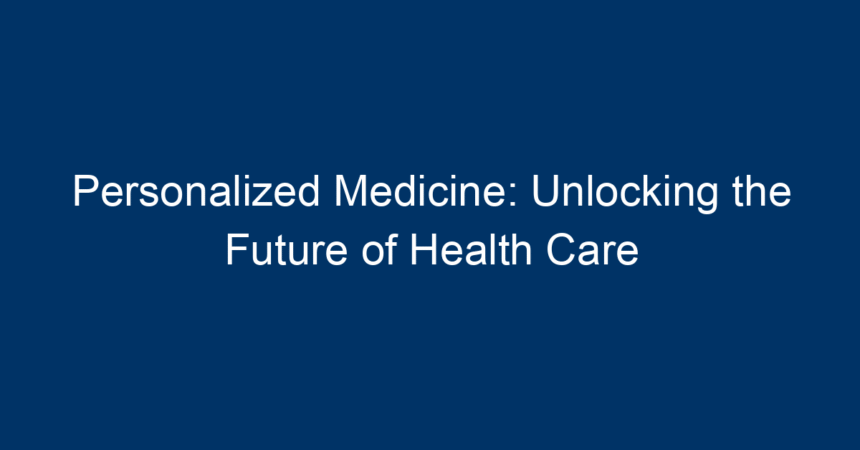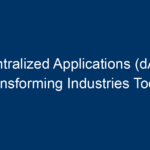In an ever-evolving healthcare landscape, personalized medicine stands out as a beacon of innovation and hope. As we move away from the traditional one-size-fits-all approach, personalized medicine tailors treatment plans based on individual genetic profiles, lifestyle choices, and specific health conditions. This article delves into how personalized medicine is revolutionizing healthcare, its benefits, challenges, and its promising future.
What is Personalized Medicine?
Personalized medicine is a groundbreaking approach to health care that considers individual differences in patients’ genes, environments, and lifestyles. This strategy allows healthcare providers to tailor treatments and preventive measures uniquely suited to each patient. By utilizing advanced technologies such as genomics, proteomics, and big data analytics, personalized medicine aims to optimize therapeutic efficacy, minimize side effects, and improve overall health outcomes.
The Role of Genomics in Personalized Medicine
At the heart of personalized medicine lies genomics, the study of genetic material and its impact on health. Advances in genomic sequencing technologies have made it possible to map an individual’s entire genome quickly and affordably.
- Genetic Profiling: By understanding the genetic makeup of patients, clinicians can predict susceptibility to certain diseases, recommend preventative measures, and select the most effective treatment plans.
- Pharmacogenomics: This branch of personalized medicine studies how genes affect a person’s response to drugs, enabling doctors to prescribe medications that are more likely to be effective.
Advancements in Technology
The rise of big data and artificial intelligence (AI) is accelerating the growth of personalized medicine. Healthcare providers can analyze vast amounts of patient data to identify trends, improve diagnostic accuracy, and predict outcomes.
- Data Analytics: By utilizing AI algorithms, healthcare professionals can uncover hidden patterns in patient data—leading to better-informed decisions and more tailored treatment strategies.
- Wearable Technology: Devices that monitor health metrics, such as heart rate, blood sugar, and activity levels, empower patients and providers to make real-time adjustments to treatment plans.
Benefits of Personalized Medicine
Improved Treatment Efficacy
One of the primary advantages of personalized medicine is the potential for improved treatment efficacy. By considering genetic and lifestyle factors, healthcare providers can:
- Avoid trial-and-error prescribing.
- Choose treatments that are more likely to be effective.
- Increase the likelihood of successful outcomes.
Reduced Side Effects
Personalized medicine minimizes the risk of adverse drug reactions. With pharmacogenomic testing, doctors can identify patients who may experience negative side effects from certain medications.
- This targeted approach reduces the likelihood of complications and hospitalizations.
- It enhances patient adherence to treatment due to a more tolerable experience.
Enhanced Preventive Care
By understanding an individual’s genetic predispositions, healthcare providers can recommend preventive measures more effectively.
- Patients can undergo regular screenings tailored to their risk factors.
- Lifestyle modifications can be personalized according to genetic insights.
Cost-Effectiveness
Though the initial investment in personalized medicine technology can be high, the long-term benefits can lead to significant cost savings. Less trial-and-error in prescribing, fewer adverse effects, and targeted preventive care contribute to reduced healthcare expenses overall.
Challenges Faced in Implementing Personalized Medicine
Despite its promise, personalized medicine faces several hurdles that can impede its widespread adoption.
Data Privacy Concerns
The use of genetic data raises significant ethical and privacy concerns. Ensuring that patient data is secure while allowing for its use in research and treatment is a delicate balance.
- Stricter regulations and guidelines are needed to protect individual privacy.
- Patients must be informed and consenting to the use of their genetic data.
Accessibility and Equity
Access to personalized medicine is not uniform across different populations. Factors such as economic status, geography, and education level can create disparities in who benefits from these innovations.
- Efforts must be made to reduce these inequalities.
- Public health initiatives can help improve access to genomic testing and personalized treatments in underserved communities.
Regulatory Challenges
The field of personalized medicine is rapidly evolving, with regulations struggling to keep pace.
- Regulatory bodies must evolve guidelines and approvals to ensure both safety and innovation.
- Striking a balance between rapid development and patient safety is crucial for public trust.
Future Directions of Personalized Medicine
As technology continues to advance, the future of personalized medicine looks promising. Here are some potential directions:
Integration into Routine Clinical Practice
Integrating personalized medicine into routine healthcare will require a shift in how healthcare providers are trained and how care is delivered.
- Medical schools must incorporate training on genomics and personalized treatment strategies.
- Healthcare systems should foster collaborative environments that improve the accessibility of personalized treatments.
Advances in Artificial Intelligence
AI will play a pivotal role in analyzing complex data sets, leading to even more personalized treatment options.
- Predictive analytics may revolutionize how diseases are detected and managed long before symptoms appear.
- Machine learning algorithms can identify new genetic variants linked to various health conditions.
Broader Applications
While oncology has been at the forefront of personalized medicine, its applications are expanding into various fields, including cardiology, neurology, and even mental health.
- Tailoring treatments based on genetic markers will lead to a broader spectrum of effective care.
- As more conditions are understood, we can expect rapid growth in personalized approaches.
Conclusion: Embracing the Future of Personalized Medicine
Personalized medicine is more than just a trend; it represents a fundamental shift in how we approach health care. From improved treatment efficacy and reduced side effects to enhanced preventive strategies, the benefits are substantial. However, challenges remain, including data privacy concerns and accessibility issues that must be addressed for widespread implementation.
As healthcare continues to embrace this innovative approach, staying informed and advocating for equitable access to personalized medicine is vital. To prepare for the future, patients and providers alike should embrace the changes and challenges, ensuring that personalized medicine becomes an integral part of tomorrow’s healthcare landscape.
Actionable Insights
- Stay Informed: Keep up with the latest developments in personalized medicine; attend conferences, read journals, and follow relevant organizations.
- Engage with Healthcare Providers: Discuss genetic testing and personalized treatment options with your healthcare team to explore what may be suitable for you.
- Advocate for Access: Support initiatives aimed at making personalized medicine accessible to all communities, ensuring that everyone has the opportunity to benefit from these advancements.
In summary, as personalized medicine unlocks new realms of healthcare, understanding and engaging with this evolution will be crucial for everyone involved in the journey toward better health.




